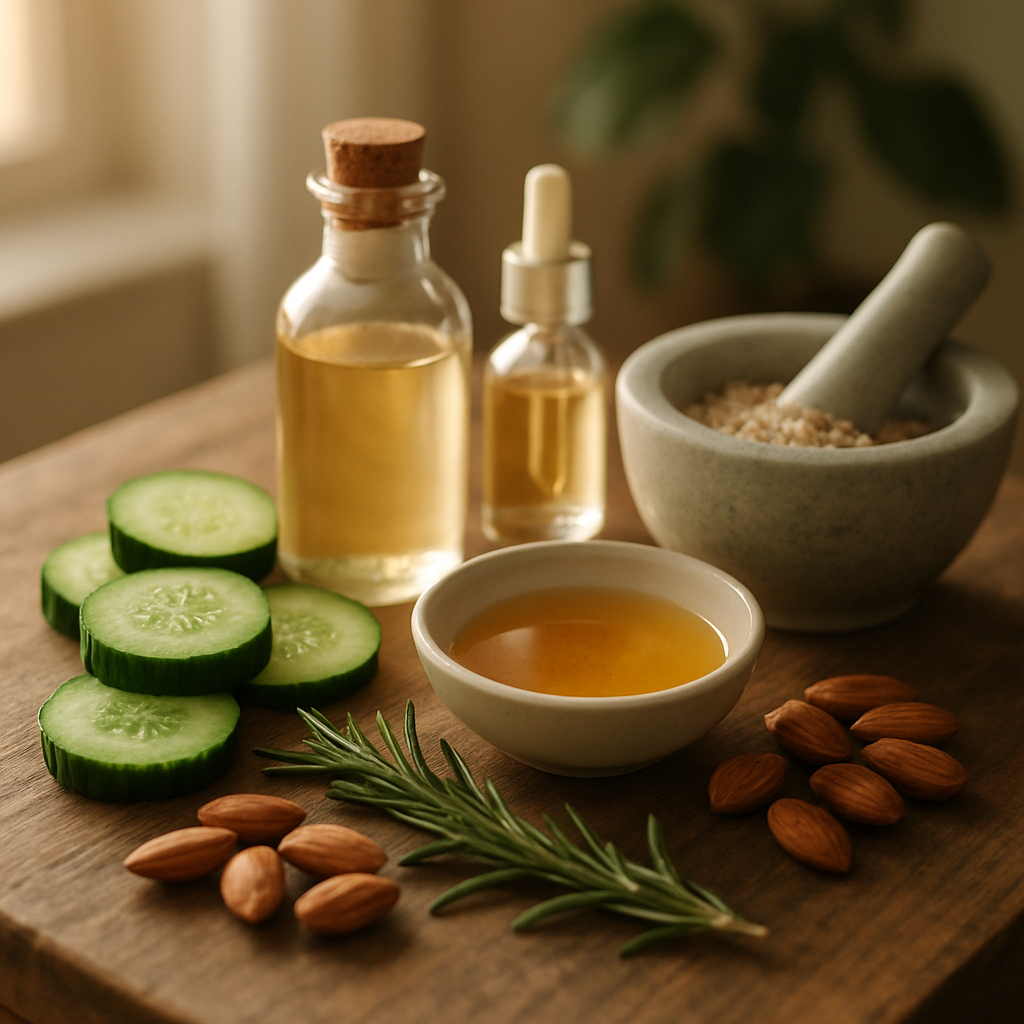
Natural ingredients have become the cornerstone of modern skincare routines, with more people turning away from synthetic chemicals and embracing what nature provides. This shift isn’t just a passing trend it’s rooted in genuine benefits that plant-based and naturally derived substances offer our skin. From hydration to healing, protection to renewal, natural ingredients provide a wealth of properties that synthetic alternatives often struggle to replicate without side effects.
Whether you’re a skincare novice or someone looking to refine your routine, understanding what these ingredients actually do (beyond the marketing hype) can transform your approach to caring for your skin. Let’s explore the most effective natural ingredients available today, their specific benefits, and how to incorporate them into your daily regimen.
Mother Nature’s Medicine Cabinet
Honey isn’t just for sweetening your tea it’s one of the most versatile natural skincare ingredients around. I still remember the first time my grandmother slathered raw honey on my teenage acne. I thought she was crazy! But within days, the inflammation had calmed down significantly. This golden substance contains natural antibacterial properties that make it effective against acne-causing bacteria while providing gentle exfoliation through its natural enzymes.
Raw honey (especially Manuka) works as a humectant, drawing moisture into the skin without clogging pores. It’s particularly good for sensitive or combination skin types that need hydration without heaviness. You can use it as a simple face mask (10-15 minutes before rinsing with warm water) or look for products where it’s listed among the first few ingredients.
Aloe vera deserves its reputation as a skin-soothing superstar. The clear gel found inside its leaves contains over 75 active compounds including vitamins, minerals, amino acids, and enzymes. Beyond its famous sunburn-relief properties, aloe reduces inflammation, speeds healing, and provides lightweight moisture suitable for all skin types.
I keep an aloe plant on my windowsill and sometimes break off a small piece to apply directly on irritated skin though store-bought pure aloe gel works just as well if you don’t have a green thumb. For everyday use, look for products containing at least 50% aloe vera to get meaningful benefits.
Tea tree oil might smell medicinal, but its power against acne is undeniable. This Australian botanical extract contains terpenes that effectively kill acne-causing bacteria while reducing inflammation. Unlike harsh chemical alternatives, properly diluted tea tree oil (never use it undiluted!) targets problem-causing microbes without completely stripping your skin’s natural moisture.
Green tea extract doesn’t just make a soothing drink it’s packed with polyphenols called catechins that function as powerful antioxidants. These compounds help neutralize free radicals that accelerate aging and protect skin cells from environmental damage. Studies show green tea compounds can reduce sun damage and may even help prevent certain skin cancers when applied topically.
Rosehip oil has become my personal favorite for addressing post-acne marks and early signs of aging. Rich in vitamins A and C along with essential fatty acids, this orange-hued oil penetrates deeply to promote cell turnover and collagen production. I noticed a significant improvement in some old acne scars after just a month of consistent use.
Powerhouse Plant Extracts
Botanical extracts offer concentrated benefits from plants that have been used medicinally for centuries. These natural compounds often work synergistically, meaning their combined effect is greater than what each component could achieve alone.
Chamomile extract contains azulene, giving it powerful anti-inflammatory properties. This gentle botanical calms irritated skin, reduces redness, and helps strengthen the skin barrier. It’s particularly beneficial for sensitive or rosacea-prone skin types. My roommate who struggles with redness swears by her chamomile-infused toner her flare-ups have decreased dramatically since she started using it.
Calendula (marigold) extract accelerates wound healing and soothes irritation. The bright orange flowers contain flavonoids and triterpenes that calm inflammation while promoting tissue regeneration. This makes calendula ideal for sensitive skin, minor cuts, or irritation. Look for it in healing balms or gentle moisturizers.
Licorice root extract contains glabridin, which helps brighten the skin by inhibiting the enzyme that produces melanin. Unlike harsh chemical brighteners, licorice root works gradually to fade dark spots without irritation, making it suitable for sensitive skin types looking to address hyperpigmentation.
Gotu kola might sound unfamiliar, but this ancient Ayurvedic herb stimulates collagen synthesis and improves circulation. Studies show it strengthens skin structure and can help minimize the appearance of scars and stretch marks when used consistently. You’ll find it in advanced natural formulations targeting skin firmness and elasticity.
Bakuchiol deserves special mention as nature’s retinol alternative. Derived from the babchi plant, this compound provides similar benefits to retinol stimulating collagen, reducing fine lines, and improving skin texture without the irritation, peeling, or sun sensitivity that retinoids often cause. I tried prescription retinol last year and my skin freaked out completely. Switching to bakuchiol gave me similar results with none of the redness or flaking.
Nourishing Natural Oils and Butters
Plant oils and butters provide essential fatty acids and lipids that strengthen the skin barrier while delivering fat-soluble vitamins and antioxidants. The key is choosing the right ones for your skin type.
Jojoba oil closely resembles human sebum, making it uniquely compatible with our skin. This golden liquid actually helps regulate oil production counterintuitive as it may seem, it can help both dry and oily skin types find balance. Its molecular structure allows it to penetrate deeply without clogging pores, carrying other beneficial ingredients along with it.
Shea butter comes from the nuts of the African shea tree and contains high concentrations of vitamins A, E, and F. Its rich texture makes it ideal for very dry or mature skin, particularly during winter months when environmental factors strip moisture from the skin. The raw, unrefined version has a distinctive nutty scent but offers maximum benefits.
Argan oil, often called “liquid gold,” contains uncommonly high levels of vitamin E and essential fatty acids. Produced from the kernels of the argan tree native to Morocco, this oil absorbs quickly and restores elasticity without heaviness. It works particularly well for normal to dry skin types and helps manage frizzy hair too (multi-purpose for the win!).
Squalane deserves more attention than it gets. While originally derived from shark liver (yikes!), today’s squalane is sustainably sourced from plants like olives or sugarcane. This lightweight oil mimics squalene, a compound our skin naturally produces but makes less of as we age. It hydrates without clogging pores and suits virtually all skin types, even acne-prone skin.
Coconut oil works beautifully for some people. This tropical oil has legitimate antibacterial properties and provides rich moisture, but its comedogenic nature means it causes breakouts for many facial skin types. I learned this the hard way after slathering it all over my face for a week and developing the worst acne of my life! It remains excellent for body care and oil cleansing for those whose skin tolerates it well.
When incorporating natural ingredients into your skincare routine, quality matters tremendously. Cold-pressed, unrefined, and organic versions typically contain higher levels of beneficial compounds. Start with one new ingredient at a time and give your skin at least two weeks to respond before adding another.
Remember that “natural” doesn’t automatically mean “gentle” or “non-irritating.” Essential oils, while natural, can cause significant irritation for sensitive skin types. Always patch test new ingredients, particularly if you have reactive skin or known allergies.
The best approach combines time-tested natural ingredients with modern formulation science. Look for products where natural actives are properly preserved (yes, preservatives are necessary for water-based products!), formulated at effective concentrations, and delivered in systems that enhance penetration.
Natural skincare isn’t about rejecting science it’s about working with your skin’s biology using ingredients it recognizes and can utilize efficiently. By understanding what each ingredient offers, you can build a routine that addresses your specific concerns while supporting your skin’s overall health.
The next time you’re considering a skincare purchase, flip that bottle around and check the ingredient list. Those plant extracts, oils, and botanical compounds aren’t just marketing fluff they’re powerful tools that can transform your skin when used thoughtfully. Your skin is your body’s largest organ it deserves ingredients that nourish it from the outside in.

